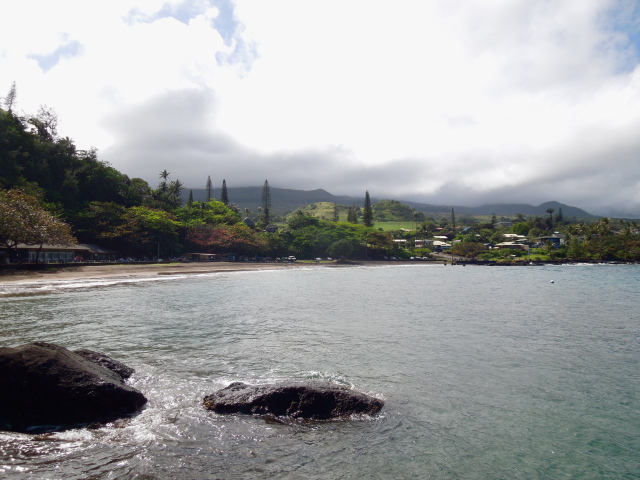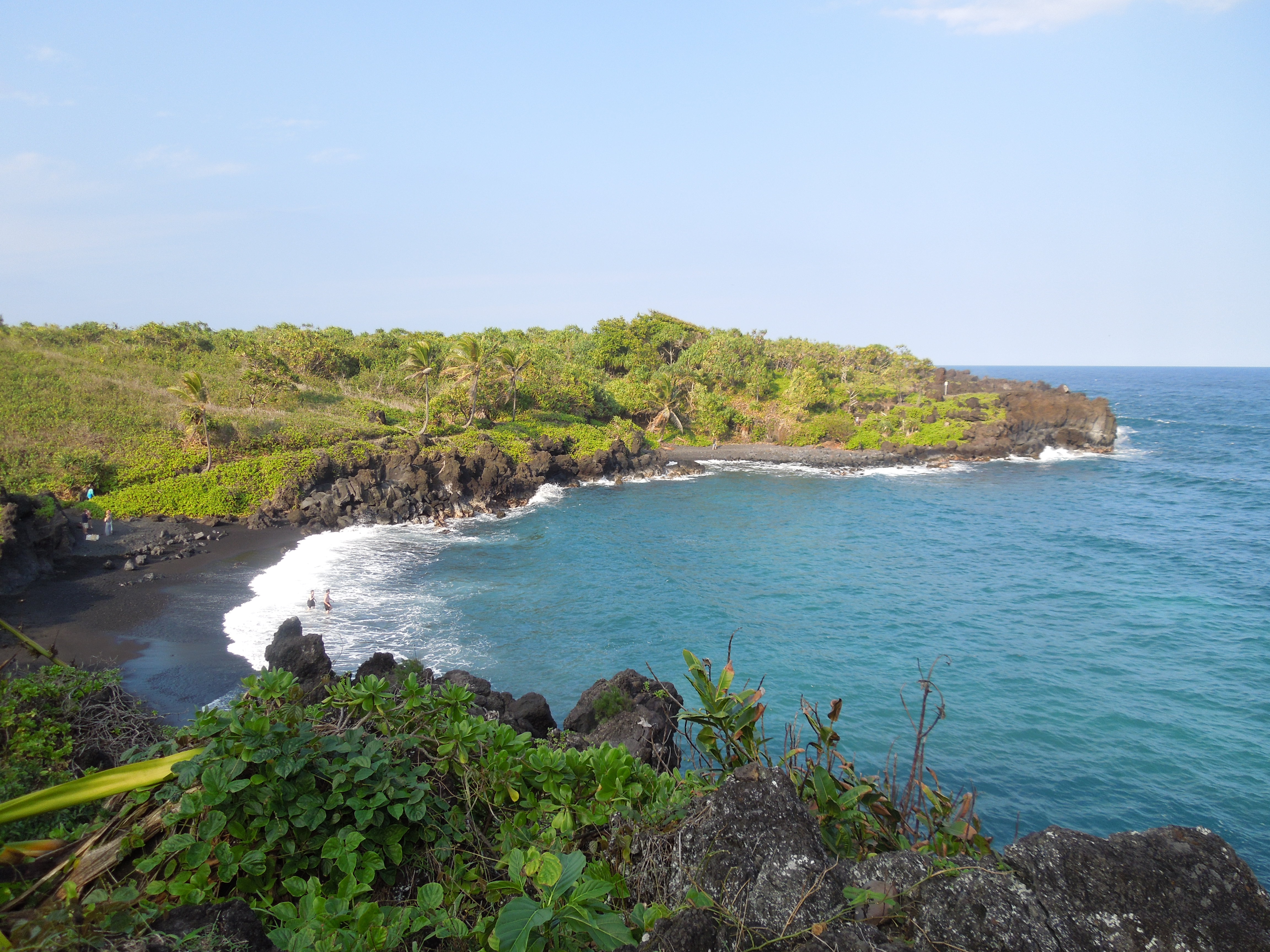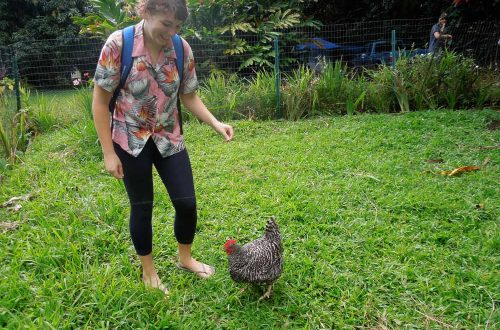When I first heard that hitchhiking was a “normal” way to get around Maui, I was skeptical. However, after living there for two months, I can vouch for hitching as an accepted and useful mode of transportation, particularly on the Hana side of Maui, where I was living and public transit is nonexistent (a once daily bus to Kahului that requires reservations in advance notwithstanding).
I didn’t do a lot of hitchhiking on Maui; I mostly just went the 3 miles between the farm where I was living and Hana Town — a short enough distance that the one time I didn’t get picked up for a ride, I was able to walk home. There were people at the farm, though, who had been using hitching as their main mode of transportation for six months or more.

If you find yourself on Maui and are interested in traveling like a local (or at least like a hippie living and working on an organic farm) you should consider hitchhiking. I found it to be a safe, efficient way to get around. With the exception of the one day I walked home, I never waited more than a few minutes for a ride.
Here are some tips if you add hitchhiking to your Hawaiian vacation itinerary:
Tips For Hitchhikers
- Find a spot on the side of the road where the shoulder is wide enough for a car to pull over and pick you up. If there isn’t room for drivers to stop safely, they aren’t going to stop at all.
- Stick your thumb out, and don’t forget to smile! If you look friendly and upbeat, you’ll get a ride faster.
- Locals are more likely to pick you up than tourists. You can typically spot tourists because they will be driving rental cars — the most common are jeeps and convertibles (for outdoorsy and luxury tourists respectively). You should still stick your thumb out and smile, but that septuagenarian with the top down probably isn’t going to pick you up.
- Throw the shaka. The shaka is also known as the “hang loose” symbol, and when a car passes you by, it’s polite to make this hand gesture. This definitely isn’t required, but it keeps me feeling positive about not getting picked up, and it’s a kind gesture.

President Obama knows what’s up; Photo by oceandesetoiles - Keep an eye out for pickup trucks. Riding in the back of a pick-up truck is one of the easiest ways to hitchhike. The driver can do you a favor with minimal effort from either party — no small talk necessary.
- Don’t try to hitch after dark. You’re just not likely to get picked up at night, so give yourself enough time to get home before it gets dark.
- Many locals smoke (and I’m not talking about cigarettes…), and you should be aware of this if a smoker picks you up. If you’re into that, they might offer you some, but if you’re not (like me), there’s no pressure to join in or accept a ride from them.
- It’s easier for women and female-presenting people* to get picked up. If you look like a big, scary dude, you might have a harder time getting picked up than if you’re a young woman in a sundress, sorry everyone.
Tips for Picking up Hitchhikers
- You should do it! Hitchhiking is a normal, accepted practice on Maui, and if you pick up a local, they might show you around.
- Know your gestures. I mentioned the shaka on the previous list, but there are other gestures you can use to talk to hitchhikers without stopping for them. If you hold your thumb and index finger close together, it indicates that you’re only going a short distance and picking them up wouldn’t be helpful.
- Don’t take a photo of hitchhikers and then refuse to give them a ride. This happened to my boyfriend and me, and I was not amused (now I’m amused, but at the time I was livid). Hitchhikers are not a tourist attraction, and this is such a dick move I shouldn’t even need to explain it.
If you’re still feeling wary of hitchhiking or picking up hitchhikers, I want to stress that I’m not recommending you sell your car and try hitchhiking in your hometown. Hitching is a culturally-accepted practice on Maui, and on some of the other Hawaiian islands (notably Big Island), and, with that context, it’s not the same as trying to hitchhike on the mainland US (although I know people who have done that too, and I mean recently, not decades ago when it was legal).
People at the farm had successfully stuck their thumbs out and gotten rides in front of police officers, so I wouldn’t worry much about the legal issue. In fact, according to Hawaii Vacation Blog, while Hawaiian state law prohibits hitchhiking, it allows county laws to supersede this ruling, and Maui County made hitchhiking legal.

I’ll end this post with my favorite hitchhiking story, told to me by one of the women at the farm. She was in Lahaina for the weekend (3+ hours away from Hana), and decided to hitch home, assuming that it would take at least 3 rides (hitching is sometimes measured in how many rides you have to catch to get somewhere rather than how many hours it takes). Not long after sticking her thumb out, she saw a Mustang convertible coming down the road and grinned broadly, hoping to get a ride in a fancy car. Amazingly, not only did the driver stop, he also told my friend he had no plans for the day and wondered if she had any advice about where he could take a nice drive. She told him about the Hana Highway, which is famous for its scenery — bamboo forests, waterfalls, ocean panoramas — and also happened to be the best way to get her home. He drove her all the way back to Hana Farms, and, in exchange, she showed him the sights along the way.
I’ve mentioned the Hana Highway before, and next week I plan to write a longer post focused entirely on this beautiful, frustrating, unusual drive.
Have you ever hitchhiked? Would you try it in Hawai’i? How about doing a hippie a favor and picking them up in your rental car?
*When I say “female-presenting people,” I am trying to be inclusive of people who are trans*, genderqueer, or identify in other non binary ways, and whose appearance reads as female.



5 Comments
Pingback:
Pingback:
Pingback:
Agness of aTukTuk
Maui is breath-taking, Emma! I love reading your articles!
Pingback: